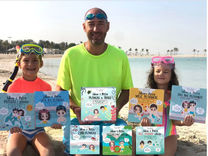An alphabet book of swimming
- Jul 5, 2021
- 6 min read
What are the most important “letters” of the alphabet for future swimmers?
Today, preschool children are expected to recognize letters, know how to spell words, even read before they even start school! Many say it is a good thing for them, as it makes it easier for them to fit into a new environment faster. Is it the same in swimming?
Are parents expected to teach their children the basic "letters", the alphabet of swimming, before they start a swimming school? NO, of course NOT! Yet, it is a totally different story if a child feels relaxed, safe and enjoys playing whenever he/she has that opportunity, while playing in the water with the parents at the same time. That is how it should be from the earliest age. Also, it is desirable that children have some positive contact with water, even if it was through educational stories, or picture books for children. However, children should acquire swimming skills and its basic "letters" under professional supervision in a swimming school!
From decades of my swimming experience and working with children, these are some of my letters from the "alphabet book of swimming" for future swimmers:
If swimming was the "alphabet", what would be its most important letters for future swimmers?
S - is a letter in swimming that gives SAFETY to children and parents in the water and near it. With it, feeling Scared of entering the water will soon become the past. When children feel safe in the water, the letter S puts a smile on their face, gives them Self-confidence, and makes them Satisfied while learning to swim. Therefore, we must first teach children how to feel safe in and around the water.
On the other hand …
Which letters and words from the "alphabet book of swimming" are first learnt, and which are easily forgotten?
The following letters from the "alphabet book of swimming" are letters that children learn most often:
B – as BALANCE in the water. If children find balance and moderation at the beginning, they will move through the water easily, and they will enjoy it more while swimming. Without this letter and proper BREATHING, it is difficult to swim! When children master the breathing technique, it will be much easier for them to master any other swimming techniques. Proper breathing in the water gives children a good swimming pace. After that, children will swim and enjoy it with ease.
… then, they also learn the letter:
T – as TRUST in Training swimming. Some children are familiar with the water at an early age, while others find it strange at the beginning. However, if there is someone on the other side of the "edge" who they can trust, it is much easier for a child to get in the water. With that, they gain Trust in swimming, feel more relaxed and learn how to keep themselves floating in the water, and swim more easily on their own.
… and children quite easily remember the letter:
R – RESPONSIBILITY is great. The responsibility is on everyone who is in and around the water. That is why in the "alphabet book of swimming" the letter R makes it clear, from the very beginning, that in the swimming triangle: coach, parent, child - everyone has some Responsibility and everyone should Respect the water and its rules. Swim. Protect yourself so you can save others.
Once they master these three letters and words BREATHING, TRUST, RESPONSIBILITY, future swimmers cannot easily forget them. These letters simply become part of their swimming routine which allows them to enjoy swimming!
Which letter or word from the “alphabet book of swimming” gives swimming an emotional aspect?
In my opinion, these five can often evoke emotions in swimming children:
T – Trainer and the Team make the heart of the "water family". Together, they go through various stages of growing up and swimming. That process of maturing in the water and near it is everything but easy. That is why the atmosphere by the pool matters, because it evokes emotions and a melody that accompanies future swimmers, encourages them during every jump, stroke, or turn. Every trainer, who knows how to adjust the quality of the swimmer to the team melody, evokes some appropriate emotions in the water. With such emotions, children swim easily through their life, growing up while not giving up!
P – like PLAYING. Children are ready to do everything with ease and with all their heart if they are Playing.That is why this letter is so important in the "alphabet book of swimming". When playing in the water and seeing the pool as a playground, children swim and enjoy it wholeheartedly. Children who bring and show their feelings in the "playground" are always up for new adventures in and out of the water!
W - WATER can flow just like time. They both leave a trace on swimming children. Drops that remain and slide down their bodies when they get out of the water seem like making them get back to it… No matter if it’s rainy or sunny, it is always a good time for swimming. Water and swimming are there for all children! It’s just all about the time you are ready to invest in it.
F – real FRIENDS are always there! Friendships made at the pool are special, as they make children feel the team spirit – while they are learning the first swimming techniques together and leaving the fear and failures behind.. with all the tears and smiles, the first crush and joint victories in acquiring this life skill.
M – as the first MEDAL in life. It is great when a medal is awarded for swimming, as a special life medal for your child. The medal does not only mean that the child was fast and won a race, but that he/she is ready for life, primarily because he/she knows how to swim and has acquired this life skill, and also because he/she has acquired many other positive qualities on this path, which are necessary for life!
What is the most difficult and easiest letter for children to memorize from the “alphabet book of swimming”?
There are no such thing as easy and difficult letters in swimming. All of them can be learnt. Of course, every child is an individual, so someone memorizes certain letters from the "alphabet book of swimming" fast, and someone easily. The word which children adore in swimming is L - LOVE. Because, with an adequate environment and professional staff, swimming coaches, children get to love swimming more easily. Then, there is no doubt that swimming will remain the love of children not only during their childhood, but also in various stages of their growing up. I believe that they will be able to pass that love on to their loved ones.
L - as LIFE is perhaps the "most difficult one" in the "alphabet book of swimming". Because, children often find it vague to grasp why some bad things happen when the waves crash, the depth swallows, the water simply takes away, or a storm blows away… But on the other hand, when children master swimming and its "letters" as well as basic rules of behaviour in and around water, it will be easier for them to handle the tides brought by life. So, give children a chance to swim and enjoy the water from an early age. Because, Life is more beautiful when you swim!
There are always parents who hear about the "alphabet book of swimming" for the first time. What is important for parents to know about the letters and "alphabet" of swimming?
Swimming, like reading and writing, is a basic life skill. Therefore, once children master the letters from the "alphabet book of swimming" while playing at the same time, they will never forget them. The alphabet of swimming shapes children, leaving them with a "code" of healthy habits. It helps them learn about their responsibilities and discipline much faster than their peers who haven’t learnet to swim yet. It gives children the freedom to move in the largest "playground" in the world - water. Don't deny the children their chance to play in it - to swim and enjoy the water!
It is up to all of us parents, coaches, to help them with this mission. Enrol your children in a swimming school today in order to get him/her master this "alphabet" and feel safe in and around the water.









































































Comments